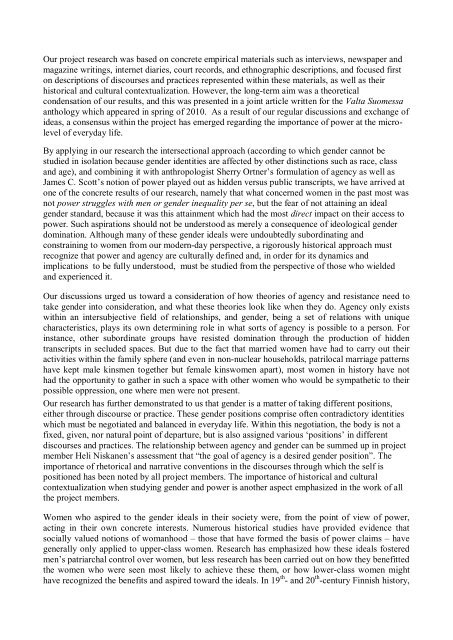Suomen Akatemia VALTA-OHJELMAN HANKKEIDEN TULOKSET
Suomen Akatemia VALTA-OHJELMAN HANKKEIDEN TULOKSET
Suomen Akatemia VALTA-OHJELMAN HANKKEIDEN TULOKSET
You also want an ePaper? Increase the reach of your titles
YUMPU automatically turns print PDFs into web optimized ePapers that Google loves.
Our project research was based on concrete empirical materials such as interviews, newspaper and<br />
magazine writings, internet diaries, court records, and ethnographic descriptions, and focused first<br />
on descriptions of discourses and practices represented within these materials, as well as their<br />
historical and cultural contextualization. However, the long-term aim was a theoretical<br />
condensation of our results, and this was presented in a joint article written for the Valta Suomessa<br />
anthology which appeared in spring of 2010. As a result of our regular discussions and exchange of<br />
ideas, a consensus within the project has emerged regarding the importance of power at the microlevel<br />
of everyday life.<br />
By applying in our research the intersectional approach (according to which gender cannot be<br />
studied in isolation because gender identities are affected by other distinctions such as race, class<br />
and age), and combining it with anthropologist Sherry Ortner’s formulation of agency as well as<br />
James C. Scott’s notion of power played out as hidden versus public transcripts, we have arrived at<br />
one of the concrete results of our research, namely that what concerned women in the past most was<br />
not power struggles with men or gender inequality per se, but the fear of not attaining an ideal<br />
gender standard, because it was this attainment which had the most direct impact on their access to<br />
power. Such aspirations should not be understood as merely a consequence of ideological gender<br />
domination. Although many of these gender ideals were undoubtedly subordinating and<br />
constraining to women from our modern-day perspective, a rigorously historical approach must<br />
recognize that power and agency are culturally defined and, in order for its dynamics and<br />
implications to be fully understood, must be studied from the perspective of those who wielded<br />
and experienced it.<br />
Our discussions urged us toward a consideration of how theories of agency and resistance need to<br />
take gender into consideration, and what these theories look like when they do. Agency only exists<br />
within an intersubjective field of relationships, and gender, being a set of relations with unique<br />
characteristics, plays its own determining role in what sorts of agency is possible to a person. For<br />
instance, other subordinate groups have resisted domination through the production of hidden<br />
transcripts in secluded spaces. But due to the fact that married women have had to carry out their<br />
activities within the family sphere (and even in non-nuclear households, patrilocal marriage patterns<br />
have kept male kinsmen together but female kinswomen apart), most women in history have not<br />
had the opportunity to gather in such a space with other women who would be sympathetic to their<br />
possible oppression, one where men were not present.<br />
Our research has further demonstrated to us that gender is a matter of taking different positions,<br />
either through discourse or practice. These gender positions comprise often contradictory identities<br />
which must be negotiated and balanced in everyday life. Within this negotiation, the body is not a<br />
fixed, given, nor natural point of departure, but is also assigned various ‘positions’ in different<br />
discourses and practices. The relationship between agency and gender can be summed up in project<br />
member Heli Niskanen’s assessment that “the goal of agency is a desired gender position”. The<br />
importance of rhetorical and narrative conventions in the discourses through which the self is<br />
positioned has been noted by all project members. The importance of historical and cultural<br />
contextualization when studying gender and power is another aspect emphasized in the work of all<br />
the project members.<br />
Women who aspired to the gender ideals in their society were, from the point of view of power,<br />
acting in their own concrete interests. Numerous historical studies have provided evidence that<br />
socially valued notions of womanhood – those that have formed the basis of power claims – have<br />
generally only applied to upper-class women. Research has emphasized how these ideals fostered<br />
men’s patriarchal control over women, but less research has been carried out on how they benefitted<br />
the women who were seen most likely to achieve these them, or how lower-class women might<br />
have recognized the benefits and aspired toward the ideals. In 19 th - and 20 th -century Finnish history,


